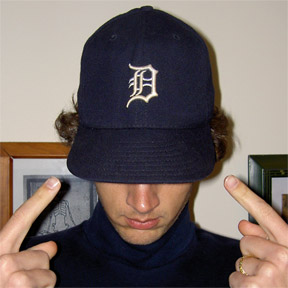Who Am I To Talk?
Although every thinking person should be wary of essays that include the words "perhaps Weird Al said it best," a new essay about the difficulties of science journalism from the Columbia Journalism Review is worth a read for those who care about science and science writing. Since Comstock does indeed have some experience in this realm, he couldn't resist gettin' his gloss on.
The essay approaches the problems in science journalism from two angles: 1) science is a hard subject to communicate, and 2) therefore editors shy away from tackling beefy science stories. I actually agree with both points, but I think the author, K.C. Cole, made a bit of a muddle of point one and stopped short on a full explanation on point two.
That science can be tough to communicate is obviously true. Part of this difficulty undoubtedly stems from the fact that the world wasn't made for human understanding. As Cole says: Humans evolved to procreate, eat, and avoid getting eaten. The fact that we have learned to understand what atoms are all about or what the universe was back to a nanosecond after its birth is literally unbelievable. But the universe doesn’t care what we can or cannot believe. It doesn’t speak our language, so there’s no reason it should “make sense.”
Although I would quibble with the choice of words--atoms aren't about anything, they simply are--I almost wish writers had room to make this point in every science story. We didn't make the world, so why should we expect to understand it perfectly.
Yet Cole presents a slightly conflicting message: Relativity and quantum mechanics have been around for nearly a century, yet they remain confusing in some sense even to those who understand these theories well. We know they’re correct because they’ve been tested so thoroughly in so many ways.
Relativity and quantum mechanics aren't correct in the way that a fact statement like the moon orbits Earth is correct. Rather these theories are elaborate models. They fit the data really well, but we should always remember that they are provisional. Cole seems to acknowledge something like this later when she writes, "Science is also innately uncertain." But how can it be uncertain yet correct?
Cole's second point is that the difficulty of science causes editors, who like to feel like know-it-alls, to shy away from covering science stories. If they don’t understand something, they often think it can’t be right — or that it’s not worth writing about. Either the writers aren’t being clear (which, of course, may be the case), or the scientists don’t know what they’re talking about (in some cases, a given).
That seems acceptable to me in a pretty basic way. I just don't think it goes far enough.
I honestly think that if editors or anybody else doesn't understand a story, then the writer is not doing a good job explaining. For me, a reader comment like the kind Cole cites here would not be a compliment: Every science writer I know has had the experience of readers coming up to them and saying: “Gee, that was fascinating; I didn’t understand it, but I’ve been thinking about it all day.”
Certainly editors do understand some intensely complex stories. The news business tolerates the byzantine twists and partial explanations of stories all the time. Think of how much ink was spilled on the Valerie Plame affair as that story unwound over months. I still don't get exactly what happened there.
But editors love stories like that because they think the stories are important (Could Dick Cheney be involved?) and they love the human intrigue (Was Plame outed to punish her husband?). Science stories do, of course, have import and intrigue. So why don't editors always care?
To give my answer, allow me to dredge up an encounter I once had with an editor. "People don't like to be told about science," she told me. I think that editors, like many people in our society, suffer from a simple anti-science bias. Sure, fear of looking like you don't understand what is going on is part of it. But a lot of people don't even get that far. Science is boring, they think, before even listening to the story. Certainly a society that views scientists as nerds and distant dorks is part of the problem. But I think I have to lay blame partially at the feet of science writers yet again. Please, show us why this stereotype is wrong.


1 comment:
Interesting critique of the article. In fact, Comcast, I think you would make an exellent critic. As far as making science "fun" -- I was just reading about an inventor named Saul Grifith who was concerned that science education is too observational. He started a website called Howtoons that shows kids how to make hovercrafts and rockets and stuff.
Post a Comment